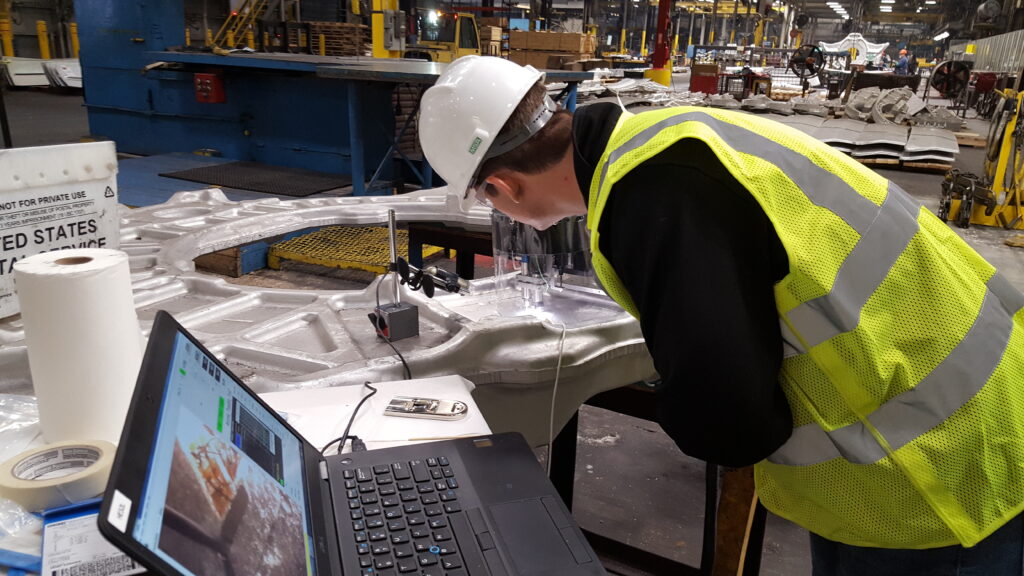In an early blog post, we discussed Hill Engineering’s efforts to build and maintain a Quality System that is compliant with ISO 17025. More recently, we touched on our quality control program, which we use as an important check to make sure that our measurements are being carried out according to established procedures and meeting certain quality requirements. Now we’re back to give another glimpse into our Quality System and talk about another important aspect, our internal audit program.
Continue reading A closer look at Hill Engineering’s internal audit program
Category: Our Work
Search results for Hill Engineering blog posts under the subject category our work
Hill Engineering acquires a new XRD system
Hill Engineering has recently acquired a new diffractometer and enclosure that will enable us to perform x-ray diffraction (XRD) residual stress measurements in our Rancho Cordova, California, laboratory.
Continue reading Hill Engineering acquires a new XRD system
New case study: Residual Stress Field Team
We invite you to read our latest case study which highlights the capabilities of our Residual Stress Field Team, who can perform many of our world-class residual stress measurements on-site at a customer’s facility. Continue reading New case study: Residual Stress Field Team
Residual Stress Field Team
Hill Engineering is committed to providing high-quality residual stress measurement data to its customers, both in our laboratory and on-site. Our Residual Stress Field Team is equipped with the same knowledge and expertise as our laboratory team to meet the challenge of performing residual stress measurements in the field.
Our Residual Stress Field Team has the experience necessary to tailor each measurement approach to meet the unique needs of the customer and bring our world-class residual stress measurement capabilities to the place it matters most – the operational environment. Challenging measurement access, complex geometry, and applications requiring rapid turn time are just a few situations where our team and equipment excel, allowing us to assess both near-surface and bulk residual stress in components that are delicate, large, or otherwise unable to be sent to our laboratory for in-house testing.

From a quality control perspective, measurements performed in the field allow customers to get a detailed glimpse of their manufacturing process, as measurements can be carried out shortly before or after a critical step, such as heat treatment, all without having the component leaving the manufacturing line, saving time for the customer.
On-site measurements and services that are available through our field team include:
The Hill Engineering Residual Stress Field Team, with its ability to perform on-site residual stress measurements, is just one of the ways we offer flexible, precise, and high-quality residual stress testing to our customers. Their mobility, coupled with advanced technology, ensures that the science of engineering is not confined to laboratories but can thrive in real-world environments where innovation truly takes flight.
If you have any questions about the capabilities of our Residual Stress Field Team and how it can help your project, please contact us.
ERS-Toolbox® brochure
Hill Engineering’s ERS-Toolbox® software predicts the residual stress and distortion caused by surface treatment processes such as shot peening, laser shock peening (LSP), and cold hole expansion. This elegant computational design tool helps engineers and analysts design, analyze, and optimize the use of these processes, maximizing the performance of critical structural details.
Continue reading ERS-Toolbox® brochure
New Publication – Near Edge Residual Stress Measurement Using Incremental Hole Drilling
A new Hill Engineering article titled “Near Edge Residual Stress Measurement Using Incremental Hole Drilling” has been published online in Experimental Mechanics. This study examines the effects of performing a hole drilling residual stress measurement near the free edge of a specimen. Below is the abstract text.
R&D Project: Strain gaging inside a tube
We are always trying to improve upon existing techniques and explore new methods so we can assure our customers that they are receiving the best services we have to offer.
After we spread out into our new laboratory space, we found some interesting things during the move that were hidden away. Something that caught our eye was a project a member of our lab team did, dealing with applying a strain gage to the inner diameter of a long tube with limited access.
Enhancing Efficiency: Hill Engineering’s scanning profilometer system
In the intricate world of residual stress analysis, the pursuit of precision is an ongoing endeavor. The Hill Engineering Scanning Profilometer (HESP) was a result of this perennial struggle, offering a satisfying, in-house solution that revolutionized our ability to perform contour method residual stress measurements.
Continue reading Enhancing Efficiency: Hill Engineering’s scanning profilometer systemHill Engineering Aims For The Horizon With Expansion
Hill Engineering is ringing in 2024 with a new expansion. By incorporating a neighboring suite into our office design, Hill Engineering now occupies our entire building, positioning us for greater achievements in the future.
Continue reading Hill Engineering Aims For The Horizon With ExpansionResidual Stress 101: The Hole Drilling Method vlog
The incremental hole drilling method is one of the most common residual stress measurement techniques employed at Hill Engineering. A reliable and rapid process, it’s the subject of our latest Residual Stress 101 episode.
Continue reading Residual Stress 101: The Hole Drilling Method vlog